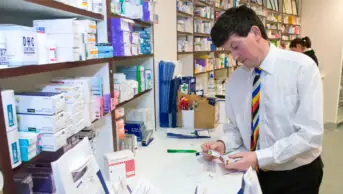
Ravi Sharma
The evidence derived from a scheme to place pharmacists in general practice to ease pressures on GPs in England will be crucial to further integrating pharmacists into primary care, according to a leading practice pharmacist.
Ravi Sharma, head of primary care integration and lead GP practice pharmacist at Green Light Healthcare, told the Royal Pharmaceutical Society (RPS) annual conference that he believed the £15m NHS England pilot was not a “temporary fix” for general practice but an expanded role for pharmacists for decades to come.
“The really important part is the evaluation of this pilot,” he said. “[I have] no doubt in my mind pharmacists will become an integral part of the general practice team, but that externally evaluated evidence is going to be extremely important for further integration of pharmacists in general practice, not just nationally and in the UK but also Europe and worldwide as well.”
NHS England launched the scheme following a campaign by the RPS and the Royal College of General Practitioners, calling for pharmacists to assist with medicines optimisation in surgeries amid mounting pressure on GP workloads. It plans to evaluate the outcomes of the pilot, which will run for three years.
Sharma, who is also chair of the Primary Care Pharmacists Association’s practice pharmacist group, told the event in Birmingham on 14 September 2015 that it was time to think beyond the pilot and establish “recognised career and development pathways for pharmacists at this level as well”. This includes at undergraduate level with the five-year integrated degree, through preregistration training and foundation to advanced practice roles.
Sharma explained how practice pharmacists can interact with hospital pharmacy and community pharmacy in primary care, seen as increasingly important for integration between the levels of care.
Between general practice and hospital, this includes transfer of care, discharge, medicines information and reconciliation. With community pharmacy, practice pharmacists can assist with transfer of care, communication between settings, triage, medicines help and care plan information, he said.
“I envisage that every practice pharmacist, whether you are working now or in the future as part of the pilot, needs to engage with the local community pharmacy network — it’s absolutely essential and pivotal for the way forward,” he said. “Help GP practices utilise the great services from community pharmacy, particularly how it can support the public.”
Sharma added that sharing best practice, better collaboration and interprofessional and experiential learning will be vital for pharmacists taking on these roles.


